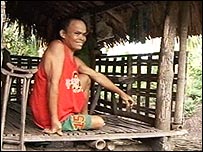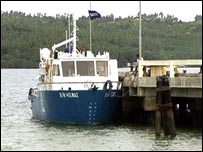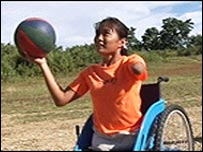|
Miracle boat' brings mobility aids
|
|||||
About two hundred miles from Manila on the Philippine island of Masbate, Frankie Villarin sits outside his home, earning what little he can making roofing from palm leaves.
He was born with one of his legs missing, and at 30 years old he has never been further than a few hundred yards from his doorstep.
"I have dreamed of having a leg," he says, "so I can walk, leave my home and earn a proper living."
A few miles away in the village of Curvada, Michelle Aplacador helps her mother grind corn.
Michelle is one of four children. But unlike the others, she was born with no legs and only one hand.
It has left her virtually a prisoner in her own home.
She says: "I feel isolated because the rest of my family can go out and go to school, but I have to stay at home, doing simple tasks."
Boat workshop
These are the forgotten people of the Philippines - one of the most beautiful countries in the world, but also one of the poorest. Nearly half the population live on less than £1 a day.
An estimated 10% are disabled and most of them live hidden away on its 7,000 islands, unable to reach any medical services.
Now a French charity, Handicap International, has come up with a simple solution to their problem - if the people can't come to the facilities, bring the facilities to them.
The Hilwai is a 50 foot floating orthopaedic clinic.
For the last year, the boat has been touring the islands of the Philippines, bringing treatment to disabled people, some of whom have spent years coping with no help.
It is the brainchild of Ben Gobin, who runs the Philippines section of the French charity Handicap International.
"Everybody thought we were crazy to do it," he says "because no one else had done it before.
"Once they were convinced, things became technical. We had to design the boat specifically for carrying out our services."
'Initiative for survival' Although the charity is French, the boat is staffed completely by Filipinos. There are six medical staff and four crew.
Much of the boat is taken up by a workshop where prosthetic limbs are individually crafted by orthopaedic technician, Elmar Villagamas.
He is disabled himself, the victim of a bombing incident in which he lost the use of his legs.
A 30 year civil war has contributed to the high numbers of people with disabilities in the Phillipines.
Elmar doesn't let his disability get in the way. In fact, he says, it helps him understand his job better.
Resources are scarce and the team have to make use of whatever they can.
In the workshop, they are using an old refrigerator compressor as a suction machine. It cost them $5 dollars in a junk shop.
Elmar calls it "initiative for survival".
Each campaign targets one island or part of an island and lasts around three months.
Herbal plant treatment
For its latest campaign, the boat has docked in the port of Cataingan on Masbate. The island is one of the poorest in the Philippines.
Its population of 750,000 people survive mainly on farming but, remote from the mainland, it's hard to earn a decent livelihood.
Local health workers have recommended Frankie Villarin for an artificial limb, but the team must assess him themselves both physically and mentally.
It's not an easy task, as he lives a half-mile trek through the forest from the nearest road.
Once he's deemed suitable, they take a plaster cast moulding of his stump which they will take back to the boat to model his new artificial leg from.
Now he's mobile, Frankie's prospects are much brighter. He can go into the town to find a job and then he hopes to find a wife.
With no legs, Michelle Aplacador is recommended for a wheelchair.
And because she also has only one arm, it will have to be a one-hand drive model, designed especially for her.
At £80 it costs more than her family earns in a month. It is good news for them. Up until now, they have had to carry Michelle on their back.
One patient who they see, Jose Mijares, lost his leg as the result of a gash to his foot while he was cutting down coconuts.
Going to town to see a doctor in town would have cost Jose a week's wages, so he didn't go.
He treated himself with herbal plants, but the wound turned septic and eventually he had to borrow money from family and friends for a costly amputation.
With no money left, he had to find a way to carry on working to feed his nine children.
He has been ploughing the fields with a makeshift leg made of bamboo.
The team are able to fit him with a prosthetic limb, so he can plough the fields in comfort, and at twice the speed.
'More than mobility'
The team also try to educate people in outlying villages about disability, as superstition and misbelief about the causes are rife.
Disabled family members are hidden away in the belief that they have brought shame on the family.
In one village, the team find Alan, a 30-year-old blind man who is unable to walk, not due to disability, but because he has been kept in one room by his mother.
By the end of their campaign, the Hilwai team have helped 69 people in villages all over Masbate to become mobile.
But they hope that they have given them a lot more than mobility, as Ben Gobin explains. "I think what is important for us is not that we have left prosthetics or a wheelchair.
"What we hope we have left is self confidence for the people to go on with their life, and the means to make their own choice.
"It's really up to them and what we want to do is to give them the capacity to get a choice in life."
The Miracle Boat will be broadcast on Wednesday, 12 April, 2006 at 2030 BST on BBC Four.
Source: http://news.bbc.co.uk/1/hi/health/4900630.stm
|
|||||


